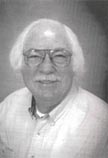Spring 2000, Volume 17.3
Poetry

William Kloefkorn
William Kloefkorn teaches and writes in Lincoln, Nebraska. He has authored more than a dozen collections of poetry, among them Dragging Sand Creek for Minnows, Drinking the Tin Cup Dry, and, most recently, Treehouse: New & Selected Poems. His memoir, This Death by Drowning (University of Nebraska Press), was published in the fall of 1987. Two collections of poetry are forthcoming—Fielding Imaginary Grounders and Welcome to Carlos.
See other work by William Kloefkorn published in Weber Studies at: Vol. 6.2, Vol. 20.1, and Vol. 22.2.
Bushes Burning
Two in particular, the one
Moses confronted, or vice versa, on his way
to the fulfillment of a promise
someone for reasons no doubt
theologically justified
didn't keep, the other
all those others within and on the outskirts
of Hiroshima, little boys, so to speak,
arm in arm with little girls burning.
I was thirteen, young enough to be lucky,
old enough to identify a shiver for what it is
when it moves unilaterally up the spine.
In Mrs. Heath's Sunday-school class
I sat in silence cheering on the underdog,
wanting old Moses to make it.
In the Champlin station, folding the Beacon,
I sat victorious and bewildered.
When I delivered the papers
into the hands of others
I discerned each time a brotherhood
blue as ignition.
And the church bells rang and kept on
ringing. It was August, and hot,
and already I had broken
at least two of the ten commandments. But
how could anyone not hate my neighbor, not
covet the woman in red during the sermon
in front of me?
Much later,
I'll learn that the code name
for the testing of the atomic bomb in New Mexico
was not Vengeance but Trinity. Before then,
parked in a blue Chevrolet in a windbreak
lush with tamarack and lilac,
my girlfriend will whisper into the porches
of my ear, I'll tell you a secret
if you promise not to keep it.
And a week later our theater, the Rialto,
will give up its sacramental ghost, will
burn to the ground, it and the Sands
of Iwo Jima.
Fevered,
I'll watch both Fact and its half-brother Fiction
go down in flames, Hell right here on earth,
whereupon around midnight I'll drift into sleep
wondering how and why and when,
in the name of all we deem holy, we go wrong.
Old Main, Early Autumn
Dark clouds descend as they
move toward me. I am, of course,
in spite of these walls, this ceiling,
about to be overwhelmed. Because
this has happened so many times before,
I say again, aloud, I am not afraid.
Beyond the window: a waning expanse
of September campus.
Students now at the base of a sudden deluge
empty themselves into the building,
down the hallway and into the room
where laughing they'll use their hands
to towel the face, restore the eye,
rearrange the hair. Today we shall consider
the lilies of the empty battlefield,
war's afterplay assembled as if beads
on a dead believer's rosary:
Achilles in his chariot
dragging the body of Hector
as if the consummate prank
around and around the pitiful walls
of Troy,
Agamemnon returning home
after all those vainglorious years,
on his way to bath and to net
touching his feet to the thick red carpet
laid down before him,
Preacher who yesterday
in the act of baptism
drowned the four-month infant, Preacher
whose god cannot be merciful beyond the mercy
his proud and disdainful creators
elect to give him. And I,
with all the rest of us,
going under.
After the Senior Prom
Whoever it was that painted graffiti
on the silver belly of the water tower
it wasn't me,
though I wish it had been. I had
two of the tree essential ingredients,
something to say and plenty of blood-red
paint. But I lacked whatever it takes
to keep the legs walking skyward. I tried
to see myself
as Kong, the bucket of paint as somehow
analogous to the flesh of someone worth
saving. But halfway to the pinnacle the knees
locked, forcing me to assume the sorry
silhouette of stasis, high-school hotdog
with high hot-
dog hopes unable to muster the wherewithal
to declare himself. I do remember the stars,
though, how their lights intensified as I
ascended the ladder, and the moon, how
it sat like Humpty Dumpty on the dry,
uneven shingles
of Henderson's outhouse. And the layout
of the town, how orderly it seemed, right-
angled and clean, in the distance. I had
intended, alone, to do the deed, to express
myself to whomever the message might concern.
Imagine my dismay
when the following morning I saw that
someone else not only had followed me, but
had followed through. And I think I know
who it was, it was Ray, my fullback buddy,
luminary if ever there was one, and watching
his remains being
lowered I'll imagine him at his highest,
painting something already I've forgotten
on the silver belly of the water tower,
in his body white cells no doubt gathering
to overwhelm the red, red the color
of the graffiti,
under a full moon red the blush on my
girlfriend's cheek when I tell her
I chickened out as we sit on a hand-tied quilt
in the bed of her father's old pickup, a Ford,
or was it an International, windows down
to set free
the dulcet tones of the Philco—I'm looking over
a four-leaf clover—each tick of the large
gold watch Grandmother one day will pass on to me
counting down the stars.
